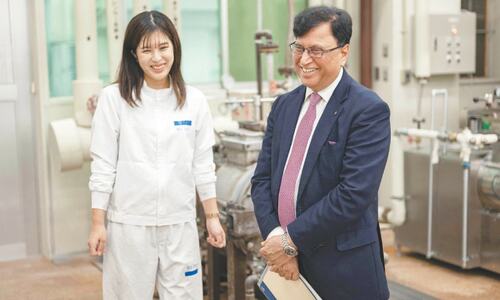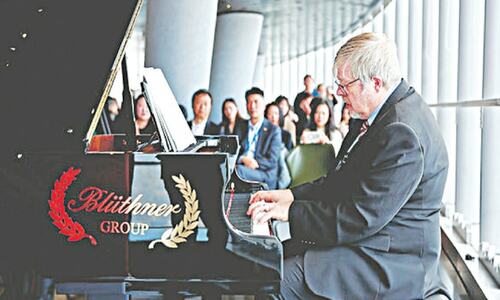 NAHR AL-BARED (Lebanon): Ibtisam Ghneim clearly recalls the day she fled, barefoot and empty-handed, from her home in this devastated Palestinian refugee camp in northern Lebanon during fighting in 2007.
NAHR AL-BARED (Lebanon): Ibtisam Ghneim clearly recalls the day she fled, barefoot and empty-handed, from her home in this devastated Palestinian refugee camp in northern Lebanon during fighting in 2007.
Ghneim is one of thousands of Palestinian refugees who fled the Nahr al-Bared camp during heavy clashes between the Lebanese army and the Islamist militant group Fatah al-Islam that killed some 400 people.
Two years after fierce battles reduced Nahr al-Bared to rubble, the refugees are growing bitter over a tight-budgeted rebuilding plan, which aims at placing the camp under the control of the Lebanese government for the first time.
Under a longstanding arrangement, the 12 Palestinian refugee camps in the country are off-limits to Lebanese authorities and are policed by armed Palestinian factions – despite a UN resolution calling for the disarmament of all militias in the country.
“I fled the camp with my children and grandchildren three days after the fighting. I did not even carry identification papers or money,” Ghneim, 45, told AFP.
“We once owned warehouses and shops, making tens of thousands of dollars a day. Now, we are left with nothing but the revenues of a small shop.”
Like many in the camp, home to 31,000 UN-registered Palestinian refugees, Ghneim’s father-in-law Mohammed Atiyeh is frustrated.
“If they wanted to rebuild the camp they would not have destroyed it in the first place,” said Atiyeh, 75, who described himself as an unemployed merchant.
“I hardly managed to get a few thousands dollars to renovate my house and buy some appliances for my shop, even though I have lost more than a million dollars.”
A major reconstruction operation by the Lebanese authorities and the UN agency for Palestinian refugees (UNRWA) is to kick off later this month to rebuild a “model camp,” according to the Lebanese-Palestinian Dialogue Committee (LPDC), a government focal point in the reconstruction effort.
“The rebuilding plan is the result of a partnership between UNRWA, the Lebanese state and the Palestinian Authority,” said LPDC advisor Ziad Sayegh.
“We seek to build a model camp that would provide a minimum standard of decent living for the Palestinians under the state’s sovereignty and authority.”
UNRWA has appealed for 450 million dollars for the rebuilding, which is scheduled to be completed in around three years. So far it has raised around 120 million dollars.
“We do need more resources to rebuild the camp but that doesn’t mean we are not going ahead with it,” said Charlie Higgins, UNRWA’s project manager. “At a certain point in the middle of this year if we don’t receive any more resources or funding we will stop and the process will be delayed.”
He said UNRWA was appealing to different countries for additional funds.
“We are confident we’ll have this money but we have to show that we are actually moving ahead,” Higgins said.
A Lebanese naval base will be set up at the edge of the camp despite strong opposition from the resident refugees who view this as a “form of restriction” and point to the fact that the base would be located near schools.
“The base is necessary for monitoring all the northern coasts and combating trafficking. This is not a restriction,” said Sayegh.
He added that an army post and a police station will also be built inside the camp, along with health centres and schools.
“The police station will ensure law enforcement and protect the Palestinians,” he said “There will be no compromise on sovereign decisions.
“It will be a model camp in terms of services and quality of buildings and roads.”
But the refugees, at least for now, view such plans as “empty promises.”
“God’s mercy is better than all their empty promises,” Ghneim said.
For Hani Mustafa, a construction worker in the camp, the entire rebuilding project is nothing but a “lie.”
“There will be no reconstruction. Don’t believe this lie,” he said.
Prior to the deadly battles between the Lebanese army and the extremists, Nahr al-Bared, which was built in 1949, was one of the country’s most prosperous camps and was considered a main trading post in northern Lebanon.
Nonetheless it suffered from poverty as well as lack of infrastructure and services, just like the other camps spread across the country.
Higgins argued that although he understood the scepticism of the dispossessed residents about rebuilding efforts, he remained confident the camp would rise from its ashes.
“I do sympathise with them (refugees) and I do understand the difficulties they are facing but they should not be too sceptical,” he said. “We are definitely here to reconstruct the camp.”
According to Othman Badr, who is in charge of a committee for displaced refugees in the camp, the unemployment rate in Nahr al-Bared is estimated at 67 per cent.
Since the end of the battles, some 13,000 of the camp’s residents have returned to the newer part of the camp which suffered less destruction. They live in renovated buildings, garages, warehouses or housing units provided by UNRWA.
The remainder fled to the nearby Beddawi camp or to other camps.
“The houses we live in are like containers, they are freezing in the winter and boiling in the summer,” Badr said.
Local charities, European-funded non-governmental organisations and other humanitarian groups provide aid to the refugees.
They also fund small income-generating projects and provide menial jobs that can earn the refugees up to 10 dollars a day, according to Badr.
“These people are living in extremely bad conditions,” he said. “And their fears and scepticism will only end once the reconstruction process becomes reality.”—AFP















































Dear visitor, the comments section is undergoing an overhaul and will return soon.